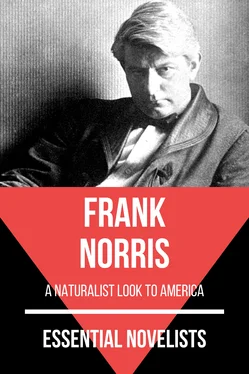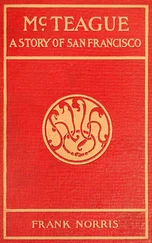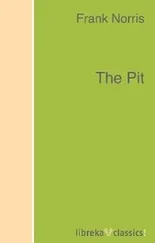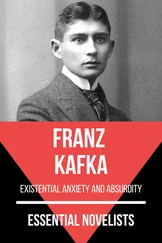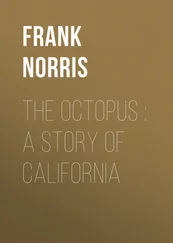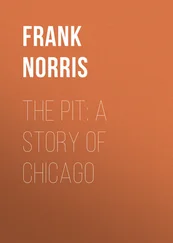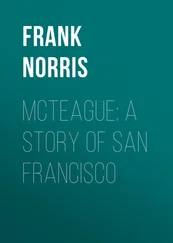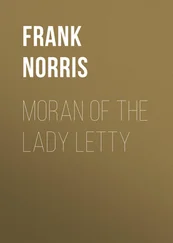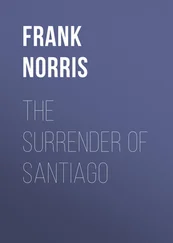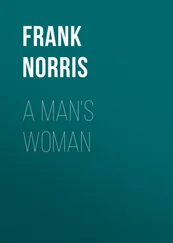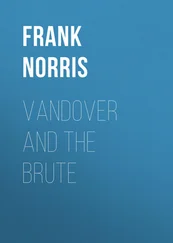Then, little by little, Polk Street dropped back to solitude. Eleven o'clock struck from the power-house clock. Lights were extinguished. At one o'clock the cable stopped, leaving an abrupt silence in the air. All at once it seemed very still. The ugly noises were the occasional footfalls of a policeman and the persistent calling of ducks and geese in the closed market. The street was asleep.
Day after day, McTeague saw the same panorama unroll itself. The bay window of his “Dental Parlors” was for him a point of vantage from which he watched the world go past.
On Sundays, however, all was changed. As he stood in the bay window, after finishing his beer, wiping his lips, and looking out into the street, McTeague was conscious of the difference. Nearly all the stores were closed. No wagons passed. A few people hurried up and down the sidewalks, dressed in cheap Sunday finery. A cable car went by; on the outside seats were a party of returning picnickers. The mother, the father, a young man, and a young girl, and three children. The two older people held empty lunch baskets in their laps, while the bands of the children's hats were stuck full of oak leaves. The girl carried a huge bunch of wilting poppies and wild flowers.
As the car approached McTeague's window the young man got up and swung himself off the platform, waving goodby to the party. Suddenly McTeague recognized him.
“There's Marcus Schouler,” he muttered behind his mustache.
Marcus Schouler was the dentist's one intimate friend. The acquaintance had begun at the car conductors' coffee-joint, where the two occupied the same table and met at every meal. Then they made the discovery that they both lived in the same flat, Marcus occupying a room on the floor above McTeague. On different occasions McTeague had treated Marcus for an ulcerated tooth and had refused to accept payment. Soon it came to be an understood thing between them. They were “pals.”
McTeague, listening, heard Marcus go up-stairs to his room above. In a few minutes his door opened again. McTeague knew that he had come out into the hall and was leaning over the banisters.
“Oh, Mac!” he called. McTeague came to his door.
“Hullo! 'sthat you, Mark?”
“Sure,” answered Marcus. “Come on up.”
“You come on down.”
“No, come on up.”
“Oh, you come on down.”
“Oh, you lazy duck!” retorted Marcus, coming down the stairs.
“Been out to the Cliff House on a picnic,” he explained as he sat down on the bed-lounge, “with my uncle and his people—the Sieppes, you know. By damn! it was hot,” he suddenly vociferated. “Just look at that! Just look at that!” he cried, dragging at his limp collar. “That's the third one since morning; it is—it is, for a fact—and you got your stove going.” He began to tell about the picnic, talking very loud and fast, gesturing furiously, very excited over trivial details. Marcus could not talk without getting excited.
“You ought t'have seen, y'ought t'have seen. I tell you, it was outa sight. It was; it was, for a fact.”
“Yes, yes,” answered McTeague, bewildered, trying to follow. “Yes, that's so.”
In recounting a certain dispute with an awkward bicyclist, in which it appeared he had become involved, Marcus quivered with rage. “'Say that again,' says I to um. 'Just say that once more, and'”—here a rolling explosion of oaths—“'you'll go back to the city in the Morgue wagon. Ain't I got a right to cross a street even, I'd like to know, without being run down—what?' I say it's outrageous. I'd a knifed him in another minute. It was an outrage. I say it was an OUTRAGE.”
“Sure it was,” McTeague hastened to reply. “Sure, sure.”
“Oh, and we had an accident,” shouted the other, suddenly off on another tack. “It was awful. Trina was in the swing there—that's my cousin Trina, you know who I mean—and she fell out. By damn! I thought she'd killed herself; struck her face on a rock and knocked out a front tooth. It's a wonder she didn't kill herself. It IS a wonder; it is, for a fact. Ain't it, now? Huh? Ain't it? Y'ought t'have seen.”
McTeague had a vague idea that Marcus Schouler was stuck on his cousin Trina. They “kept company” a good deal; Marcus took dinner with the Sieppes every Saturday evening at their home at B Street station, across the bay, and Sunday afternoons he and the family usually made little excursions into the suburbs. McTeague began to wonder dimly how it was that on this occasion Marcus had not gone home with his cousin. As sometimes happens, Marcus furnished the explanation upon the instant.
“I promised a duck up here on the avenue I'd call for his dog at four this afternoon.”
Marcus was Old Grannis's assistant in a little dog hospital that the latter had opened in a sort of alley just off Polk Street, some four blocks above Old Grannis lived in one of the back rooms of McTeague's flat. He was an Englishman and an expert dog surgeon, but Marcus Schouler was a bungler in the profession. His father had been a veterinary surgeon who had kept a livery stable near by, on California Street, and Marcus's knowledge of the diseases of domestic animals had been picked up in a haphazard way, much after the manner of McTeague's education. Somehow he managed to impress Old Grannis, a gentle, simple-minded old man, with a sense of his fitness, bewildering him with a torrent of empty phrases that he delivered with fierce gestures and with a manner of the greatest conviction.
“You'd better come along with me, Mac,” observed Marcus. “We'll get the duck's dog, and then we'll take a little walk, huh? You got nothun to do. Come along.”
McTeague went out with him, and the two friends proceeded up to the avenue to the house where the dog was to be found. It was a huge mansion-like place, set in an enormous garden that occupied a whole third of the block; and while Marcus tramped up the front steps and rang the doorbell boldly, to show his independence, McTeague remained below on the sidewalk, gazing stupidly at the curtained windows, the marble steps, and the bronze griffins, troubled and a little confused by all this massive luxury.
After they had taken the dog to the hospital and had left him to whimper behind the wire netting, they returned to Polk Street and had a glass of beer in the back room of Joe Frenna's corner grocery.
Ever since they had left the huge mansion on the avenue, Marcus had been attacking the capitalists, a class which he pretended to execrate. It was a pose which he often assumed, certain of impressing the dentist. Marcus had picked up a few half-truths of political economy—it was impossible to say where—and as soon as the two had settled themselves to their beer in Frenna's back room he took up the theme of the labor question. He discussed it at the top of his voice, vociferating, shaking his fists, exciting himself with his own noise. He was continually making use of the stock phrases of the professional politician—phrases he had caught at some of the ward “rallies” and “ratification meetings.” These rolled off his tongue with incredible emphasis, appearing at every turn of his conversation—“Outraged constituencies,” “cause of labor,” “wage earners,” “opinions biased by personal interests,” “eyes blinded by party prejudice.” McTeague listened to him, awestruck.
“There's where the evil lies,” Marcus would cry. “The masses must learn self-control; it stands to reason. Look at the figures, look at the figures. Decrease the number of wage earners and you increase wages, don't you? don't you?”
Absolutely stupid, and understanding never a word, McTeague would answer:
“Yes, yes, that's it—self-control—that's the word.”
“It's the capitalists that's ruining the cause of labor,” shouted Marcus, banging the table with his fist till the beer glasses danced; “white-livered drones, traitors, with their livers white as snow, eatun the bread of widows and orphuns; there's where the evil lies.”
Читать дальше
